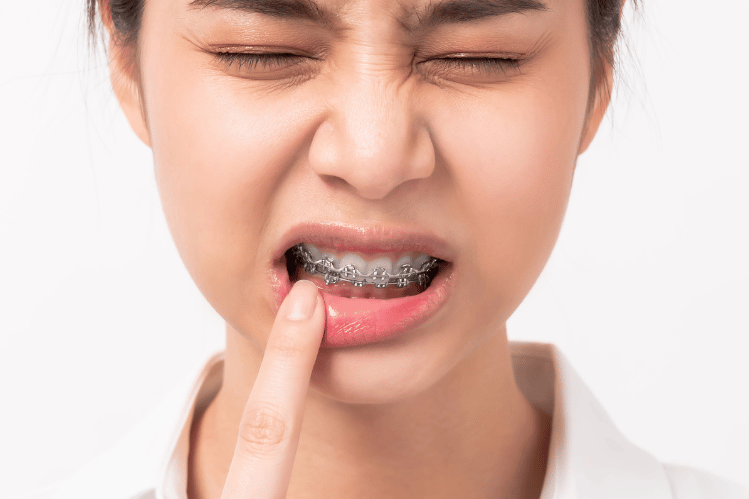
Metal braces are a common orthodontic treatment option used to correct dental misalignments. They are made up of metal brackets that are affixed to the teeth and joined by a wire, which progressively moves the teeth into the desired position. While metal braces have effectively corrected dental problems, they are not without risks and dangers.
Pain and Discomfort
One of the primary risks of metal braces is that they can cause pain and discomfort. When the braces are first attached to the teeth, it is common for patients to experience soreness and discomfort in their mouths. This discomfort can last for several days or even weeks, depending on the individual's pain tolerance. Moreover, the metal brackets and wires can rub against the inside of the mouth, causing irritation and sores. To alleviate the discomfort, patients may need to take pain relievers or use orthodontic wax to cover the brackets.
Difficulty in Maintaining Oral Hygiene
Another risk associated with metal braces is that they can make it difficult to maintain good oral hygiene. The brackets and wires prevent proper brushing and flossing, making it easy for food particles to get trapped between the teeth and the braces. This can lead to the accumulation of bacteria and plaque, which can cause tooth decay, gum disease, and bad breath. To prevent these problems, patients must take extra care to clean their teeth and braces thoroughly, using special brushes and flossers designed for use with braces.
Complications
In addition to pain and oral hygiene issues, metal braces can cause other complications. For example, the wires and brackets can break or become loose, requiring emergency visits to the orthodontist to repair the damage. Additionally, the braces can cause damage to the enamel of the teeth, leaving them vulnerable to cavities and decay. This is because the brackets create small crevices in the enamel where bacteria can accumulate.
Demineralization of Teeth
Another significant danger of metal braces is that they can lead to demineralization of the teeth. This occurs when the acidic environment created by plaque and bacteria breaks down the minerals in the enamel, causing it to weaken and become more susceptible to decay. Metal braces can exacerbate this problem by making it difficult to clean the teeth properly. As a result, patients with metal braces may be more prone to developing cavities and tooth decay.
Changes in Jaw and Facial Bones
Furthermore, metal braces can also cause changes to the structure of the jaw and facial bones. This is because the constant pressure exerted by the braces can affect the growth and development of the bones in the mouth and face. In rare cases, metal braces may even cause permanent damage to the roots of the teeth or cause the teeth to become loose or fall out.
Why Metal Braces Are Still Popular
Despite the risks and dangers of metal braces, they remain a popular treatment option for orthodontic patients. This is because they effectively correct a wide range of dental problems, including crooked teeth, crowded teeth, overbites, and underbites. Additionally, metal braces are typically less expensive than other orthodontic treatments, making them a more affordable option for many patients.
How to Minimize the Risks of Metal Braces
To minimize the risks associated with metal braces, patients must choose a reputable orthodontist with a track record of success. Patients should also follow the orthodontist's instructions for the care and maintenance of their braces, including regular dental checkups and cleanings. Additionally, patients can take steps to improve their oral hygiene by brushing and flossing regularly, using fluoride toothpaste, and avoiding sugary and acidic foods and drinks.
FAQs
What are some common risks associated with metal braces?
Metal braces can cause pain, discomfort, and irritation in the mouth. There is also a risk of tooth decay or gum disease if proper oral hygiene is not maintained during treatment. In rare cases, allergic reactions to the metal components of the braces can occur.
Are metal braces safe for children?
Yes, metal braces are generally safe for children. However, they should be closely monitored by an orthodontist to ensure proper placement and care throughout treatment.
Can metal braces cause permanent damage to teeth?
If metal braces are not properly cared for, they can lead to permanent damage to teeth, such as enamel erosion, decalcification, or discoloration. However, these risks can be minimized with proper oral hygiene and regular visits to the orthodontist.
How long does treatment with metal braces typically last?
Treatment with metal braces usually lasts anywhere from 18 to 36 months, depending on the severity of the case and the patient's compliance with the treatment plan.
What are some alternatives to metal braces?
There are several alternatives to metal braces, such as clear aligners, ceramic braces, and lingual braces. It is important to discuss these options with an orthodontist to determine which option is best for each case.

